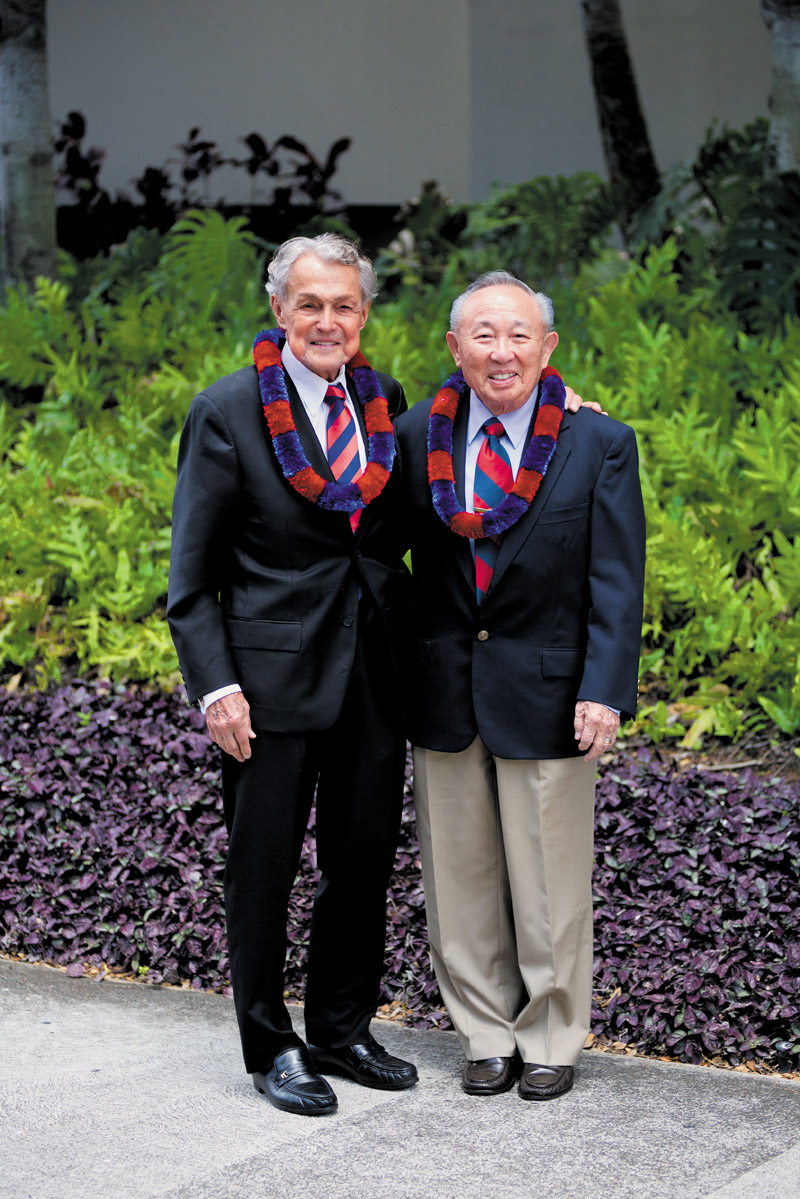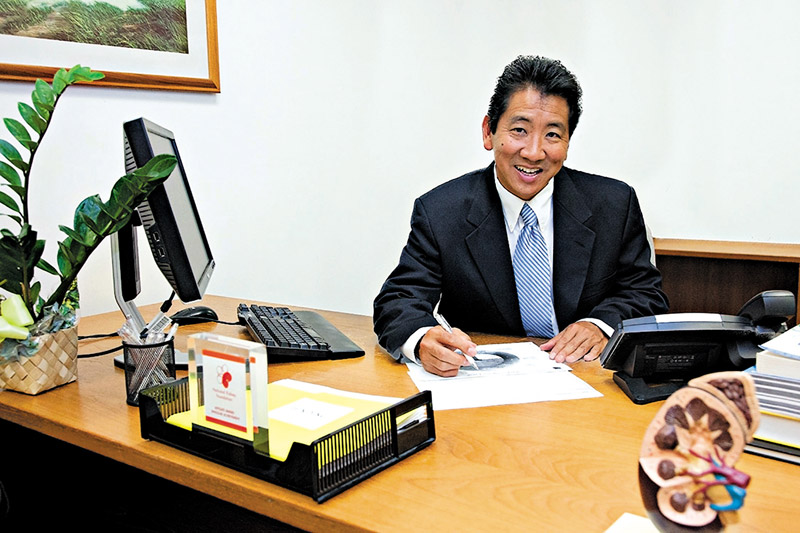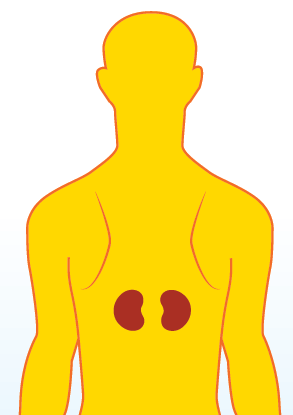Bethel Street Buddies

Lawrence K.W. Tseu and John Henry Felix, who will be honored by National Kidney Foundation of Hawai‘i, have come a long way since their childhood days shining shoes on Bethel Street and selling newspapers.
If there’s one thing John Henry Felix and Lawrence K.W. Tseu don’t need, it’s another community honor (deserving as they are). The prominent citizens have rooms full of framed certificates, medals, koa bowls, plaques and laudatory scrolls for their business verve, not to mention numerous educational and philanthropic triumphs.
Yet the recognition they receive from National Kidney Foundation of Hawai‘i on June 14 will likely hold a special place in their hearts because it underscores a true test of their close friendship.
This time, it’s personal. Felix, 88, suffers from kidney disease and is awaiting an organ transplant. Tseu, 86, wants to donate his kidney, but was rejected due to age. In tearful reflection of this plight, both men bravely share their story to exemplify the delicate balance of patient survival and life-sustaining hope in the organ-matching process.

John Henry Felix and Lawrence K.W. Tseu also are Saint Louis School alums
It is heartbreaking for a willing donor and compassionate soul like Tseu to see his childhood friend endure the rigors of renal disease and the stringent demands of dialysis. For someone also known for generous philanthropy, this is one time Tseu is regretfully sidelined. As medical research and health care race to find solutions to chronic kidney disease, such as artificial organs, patients like Felix must do their best to live within existing protocols.
Most critically, one must muster unwavering psychological, physical and spiritual strength to cope.
“It’s rather disheartening,” Felix says. “My health until over a year ago was excellent. I don’t have diabetes or heart problems. I keep in good shape, jogging, lifting weights, doing calisthenics almost every day. The kidney failure came rather suddenly.
“In accessing the situation, it’s possible that medication taken for another condition affected my kidney,” he explains.

Glen Hayashida, National Kidney Foundation of Hawai‘i president/CEO PHOTO COURTESY NATIONAL KIDNEY FOUNDATION OF HAWAI‘I
“Soon as I found out that John needed a kidney, I decided in a heartbeat to offer myself as a donor,” says Tseu. “There’s always a risk involved, but I was willing to take that risk because he’s my buddy, and there is no greater sacrifice that a man can give for a friend.
“I took better care of myself in hopes of being his donor,” Tseu recalls. Yet he was rejected.
“He eats too much saimin,” chimes in Felix with a laugh.
Rags to Riches
The good-natured exchange between bosom buddies harkens to their childhood as shoeshine boys on Bethel Street. Felix was the “haole boy from Papakōlea” and Tseu was the “Kalihi bum” who hustled sailors and soldiers for 10-cent shoeshines. Both came from poor families, so they earned money by shining shoes, diving for coins on boat days (visitors arrived in the islands via Matson ship liners between the ’20s and ’40s) and selling newspapers.
“It’s a real rags-to-riches story,” Tseu offers.
“And now we’re going from riches to rags,” Felix counters.
Well, hardly.
To know Drs. Felix, Ph.D., and Tseu, a retired dentist, is to know two outstanding citizens who personify servant leadership and civic responsibility. Whatever success and wealth they earn through hard work and good fortune revert to the community in charitable, educational and humanitarian gifts.
For Felix, the value of sharing with others comes from his Catholic upbringing and inspiration of St. Francis of Assisi, his patron saint.
“Lord, make me an instrument of your peace,” he quotes the founder of the Franciscans. “For it is in giving that we receive.”
Felix has a distinguished career in government, business, education, diplomacy, community service, philanthropy and humanitarian service spanning half a century.
“I can’t hold a steady job,” he muses.
He has been chairman-CEO of Hawai‘i Medical Assurance Association since 2006. The remarkable senior works seven days a week, keeps a busy schedule of business and social commitments, and undergoes dialysis treatments three times a week for four hours each time.
Academic Advocates
Felix and Tseu, who are Saint Louis School alums, have distinguished ties to the University of Oxford in the United Kingdom. Felix is president of the Tseu Medical Institute at Harris Manchester College, Oxford. The research and medical care institute is named for Tseu and his late wife, BoHing Chan Tseu.
In 2009, Tseu made the largest single contribution to the University of Oxford designated for the use of an Oxford college. He and Felix are members of the University’s elite Chancellors Court of Benefactors.
“We are only stewards of our earthly wealth,” Tseu proclaims. “Everything we have, who we are and what we become with our success and blessings are gifts from God.”
The two shoeshine kids from Bethel Street have shown that any one can meet life’s challenges with will-power and determination. Felix says he is empowered by “faith, hope and charity.”
Benefit Gala
Supporters of National Kidney Foundation of Hawai‘i will rally to that cause at a 30th anniversary gala from 5 to 9 p.m. Thursday, June 14, at Honolulu Country Club. Dr. Eugene Wong, Felix’s nephrologist at The Queen’s Medical Center, will share the spotlight with the honorees.
“It’s our way to thank the community and honorees for their support over the years,” says foundation president/CEO Glen Hayashida. “From a small three-person office starting in 1988, we have grown to serve the broader needs of patients, providers and other stakeholders in the fight against kidney disease.
“We want to temper fear with understanding and knowledge that encourages people to make healthy choices and stem the tide of chronic kidney disease (CKD),” he adds.
Until groundbreaking treatments such as dialysis and adjustments in Medicare coverage came along, end-stage renal disease or kidney failure was a death sentence. There were no options. Also, detecting kidney disease is complicated by often being asymptomatic (having no symptoms).
“There’s been a dramatic increase in chronic kidney disease reaching epidemic proportions,” Hayashida reports. “The rates are even higher among Hawai‘i’s native Hawaiian and Pacific islander, Filipino and Japanese ethnic groups. These groups have a risk for CKD that is two to four times greater than other ethnicities.”
Kidney failure is 30 percent higher in Hawai‘i than the national average, he cites.
“It is shocking to think that close to 30 percent of our nation’s Medicare budget is spent on kidney and kidney-related diseases,” the executive says.
The main causes of CKD are diabetes and high-blood pressure. Over 70 percent of people living with kidney failure started with diabetes, which afflicts one in three local residents.
People whose kidneys have stopped working must go on dialysis or get an organ transplant. More than 4,000 Hawai‘i residents are on dialysis. Approximately 450 people are on the organ waiting list and more than 90 percent are for kidney transplants, the Hawai‘i foundation reports.
Despite the rigors of dialysis, many people still live normal lives. Felix is an example of this, while awaiting a transplant or artificial kidney.
“The artificial kidney is being developed at the University of California at San Francisco in collaboration with Silicon Valley,” Felix says. “The advantage is that there is no chance of rejection.”
UCSF’s kidney project is creating a small, surgically implanted, free-standing bioartificial kidney to treat end-stage renal disease. It is an answer to the short-term solution of dialysis and the longer-term, but impermanent, solution of a living kidney transplant for which donor organs are limited.
“I’ll be one of the oldest recipients for the artifi cial kidney,” says a hopeful Felix with a smile. “The kidney is a very important organ. I miss it.”
For information and tickets to the National Kidney Foundation of Hawai‘i’s Great Gatsby benefit gala on June 14 at Honolulu Country Club, visit the website at kidneyhi.org or call 593-1515.
Kidney Primer

The primary function of kidneys is to remove waste and excess water from the body.
Kidneys are located in one’s back, below the rib cage.
Most people have two kidneys.
Every day, kidneys filter 200 liters of blood, enough to fi ll a large bathtub.
A kidney is about the size of a fist.
30 million adults in the U.S. have chronic kidney disease (most don’t even know it).
Source: National Kidney Foundation






